On the Road with Fred and Barb - Newsletter #12
June 20-21 TOK to GLENNALLEN
We had been told this road (the Tok Cut-off) was really
affected by last year's earthquake. It measured 7.9 and supposedly had
done some damage to the road. But after yesterday's bouncing we didn't
find it near as bad. A few gravel patches which were actually quite
smooth. Mainly you had to be careful to watch for dips in the road.
And at least it quit raining. Just some clouds over the mountains and
occasional drizzle.
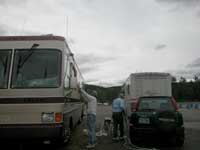
We are staying in the Gakona Alaska RV campground on the
Copper River and the owners are letting us wash our rigs. So the boys
got out the power washer and have been going at it for the past couple
hours. I decided if the outside was going to be clean, I better give
the inside a good cleaning too.
June 21: The Great Fish Story
Fred and I decided to take advantage of the fact there
was a salmon fishing guide operation on site at the campground and signed
up for a half day. It sounded like fun as they used large rubber inflatable
rafts to float down the river. Besides the prospect of catching some
king salmon that were coming back up the Gulkana River to spawn, the
company said they often see moose, eagles and other birds along the
way. Little did I know what I was getting myself into. We donned rubber
waders then piled into a pickup truck at 7:00 in the morning for the
20 minute drive upriver to the put-in point. From there we had to hike
about ½ mile along a narrow, muddy trail down to the river. At
one point my foot almost came out of the boot when it stayed stuck in
the mud!
We climbed into the bow of the raft and we were off -
just the two of us and our guide - a young teacher from Idaho who has
been doing this each summer for the last 6 years. There was no motor
but since we were going downstream it was just a matter of him using
oars to steer thru the small rapids and around rocks. Now came the second
surprise - we weren't fishing from the boat. We weren't just throwing
our lines in the water and waiting for a fish. No, at each fishing spot,
we got out of the boat and waded into the water up to our knees being
careful not to slip on the rocks. I didn't want to end up on my butt
in the cold river. Then we had to cast up river (into the wind I might
add) letting the lead weight sink to the bottom and bounce downstream.
It only took 30 seconds at the most for it to get downstream and then
you had to reel it back in and cast again. This was more work than I
had counted on. Unlike other fishing I had done, in this case movement
of the pole meant no fish. If the movement stopped it could mean a fish
was trying the bait and you had to jerk the pole hard to hook it. Adding
to the challenge were the mosquitos. Normally we were told they didn't
have any on the river but due to the recent rains, they were around.
Bug spray didn't seem to help as they swarmed around our heads. Thank
goodness we had brought bug nets that go over your hat. Noticed several
other fishermen wearing them too.
We stayed about ½ hour at each of the first two
holes, then thankfully had a nice rest while we floated for awhile down
river to the next spot. So far no wildlife had been spotted. I looked
at my watch and it was only 9:30. How in the world was I going to last
another 3 hours!
Our guide told us that king salmon like to rest in deep
holes along the river in between fighting the current and shallow rapids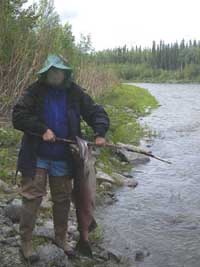 going upstream to their spawning ground. They had been having good luck
at the next spot so we would stay there for about an hour. Still nothing
and I was getting real tired from all that casting. One more spot to
go - they had caught one there the day before. This time, instead of
wading into the water, there was a nice grassy patch along the water's
edge on which to stand. We started casting and my pole stopped bouncing.
I jerked it up and knew I had a fish. The guide grabbed onto my pole,
thank goodness, positioned it on my hip and we played it in. He told
me to keep the tip up and the line tight. When the fish fought, let
it. When it stopped, reel. This fish was a fighter and even with the
guide helping to raise the pole, I thought my arm was going to give
out. Didn't know who would tire first - me or the fish. But I finally
won the battle. We had to walk downstream a ways with the fish to stay
with him before we could bring him in. Good thing we weren't in the
slippery rock strewn water.The result - a beautiful 23 pound king salmon.
going upstream to their spawning ground. They had been having good luck
at the next spot so we would stay there for about an hour. Still nothing
and I was getting real tired from all that casting. One more spot to
go - they had caught one there the day before. This time, instead of
wading into the water, there was a nice grassy patch along the water's
edge on which to stand. We started casting and my pole stopped bouncing.
I jerked it up and knew I had a fish. The guide grabbed onto my pole,
thank goodness, positioned it on my hip and we played it in. He told
me to keep the tip up and the line tight. When the fish fought, let
it. When it stopped, reel. This fish was a fighter and even with the
guide helping to raise the pole, I thought my arm was going to give
out. Didn't know who would tire first - me or the fish. But I finally
won the battle. We had to walk downstream a ways with the fish to stay
with him before we could bring him in. Good thing we weren't in the
slippery rock strewn water.The result - a beautiful 23 pound king salmon.
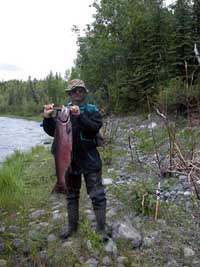 After
all the picture taking, we again starting casting. This time Fred was
the lucky one to bring one in - a nice 21.5 pounder. You are only allowed
1 King Salmon/person/day and only 4 total all season. So our guide started
filleting but told us to keep fishing for the sport of it. No sooner
had I started casting than another one hit. This time I brought it in
by myself. And it fought even harder than the first one. Didn't think
I'd ever get it in.
After
all the picture taking, we again starting casting. This time Fred was
the lucky one to bring one in - a nice 21.5 pounder. You are only allowed
1 King Salmon/person/day and only 4 total all season. So our guide started
filleting but told us to keep fishing for the sport of it. No sooner
had I started casting than another one hit. This time I brought it in
by myself. And it fought even harder than the first one. Didn't think
I'd ever get it in.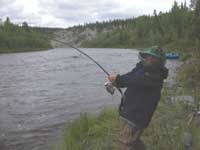
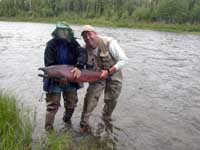 We
took a quick picture and then let it continue on its way. Then Fred
caught another one.
We
took a quick picture and then let it continue on its way. Then Fred
caught another one. 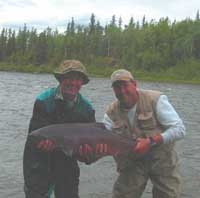 We
had definitely found the hole! By this time I was exhausted, the filleting
was done so we floated down to our take out point. Saw a couple bald
eagles and some arctic terns but still no moose. One last bit of energy
needed to climb the hill to the truck.
We
had definitely found the hole! By this time I was exhausted, the filleting
was done so we floated down to our take out point. Saw a couple bald
eagles and some arctic terns but still no moose. One last bit of energy
needed to climb the hill to the truck.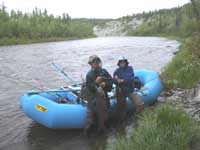
This was an unbelievable experience. I've seen pictures
of fishermen lining the rivers casting for salmon. Now I are one! Our
only problem was what to do with all the salmon. Our freezer was already
full from Fred's catch in Skagway. So we took those frozen fillets out
and put them in our Styrofoam ice chest and put the new fish in the
freezer. Hope they all stay frozen till we get to Anchorage when we
might have some canned or smoked.
After a quick shower, we packed up and started on our
way to Valdez. Steve and Robbie had left in the morning so we would
be meeting them at our campground.

